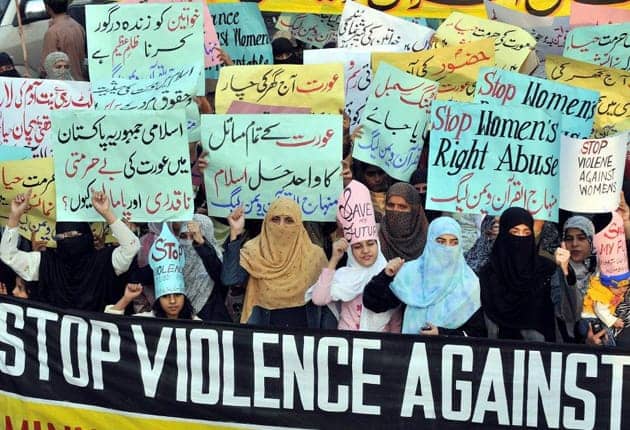
by Wanda Sabir
I am a domestic violence survivor. The malady, a “post-slavery relic,”[1] does not skip generations. I watched my father hit my mother. The term “beaten” does not quite reflect what I recall – my mother resisted, just as her embodied mothers did as well. The idea of family, something she desired, kept pulling her back until she finally left.
Mama left my father, brother and me. The terror did not stop. We were slapped, hit, beheaded. At 19 years old, I left with my head in one hand and a packed bag in the other. I stepped into a worse horror: a bed I could not vacate until buzzards circled my door as the black widower departed.
I was 29 then. That ex-husband morphed into several other fatalities. I kept marrying my father over and over again. Now I keep my distance from any intimate relationships[2]. All Muslim men – Sufi, NOI converts to Sunni – emancipated and still shackled.
They were no good. None of them.
Forty years ago, I asked the imam at the Muslim Center I attended if we could host a circle for women survivors of domestic violence. He agreed. He said I could host it – but I didn’t want to host it. I just wanted to attend one.
I’d still like to attend such a circle, one composed of women born in America and raised Muslim from the Nation of Islam forward. Women who have had “ayats” shoved down their throats – ayats, or verses that condone male violence against women.
“Beat her lightly … She deserved it”; “Men are the caretakers of women”; “You may dislike a thing that brings about a great deal of good.” All quotes from the Qur’an.
I didn’t have anywhere to run. I asked. I looked for announcements along an underground railroad. There were no safe houses, no shelters, no abolitionist movement. My father told me, “A woman’s place is with her husband.”
I should have expected such a response, but I didn’t. I stayed with the abuser until I had a job that could support me and my two daughters – three long scary years. I just wanted to get away before they too bore witness and became trapped in memories, nightmares haunting me to date.
“Beat her lightly … She deserved it”; “Men are the caretakers of women”; “You may dislike a thing that brings about a great deal of good.” All quotes from the Qur’an.
I don’t think they have suffered such abuse in their relationships, but I can’t say the same for their children. Perhaps such violence lies dormant, like a sleeper cell, and is triggered in certain circumstances.
I have experienced physical and emotional abuse. I think the emotional abuse is worse – it is here that insidious manipulation happens. The wounds so invisible that one might think she imagined them.
This is what the perpetrator wants us to believe. Sisters, the wounds are real: indecision, self-doubt, low self-esteem, depression, anxiety, suicide.
I keep a therapist employed. I think that is why I am still alive and functional, 41 years after the first time I was hit. I was pregnant with my first child. It was at Lake Merritt. I was sitting in a swing by the bird sanctuary.
Bay View Arts and Culture Editor Wanda Sabir can be reached at wanda@wandaspicks.com. Visit her website at www.wandaspicks.com throughout the month for updates to Wanda’s Picks, her blog, photos and Wanda’s Picks Radio. Her shows are streamed live Wednesdays and Fridays at 8 a.m., can be heard by phone at 347-237-4610 and are archived at http://www.blogtalkradio.com/wandas-picks.
[1] From the poem “Buried Placenta,” “Volume I: Daddy’s Girl,” Wanda Sabir 2018
[2] From the poem “Virgin Happy Hour,” “Volume I: Daddy’s Girl,” Wanda Sabir 2018





